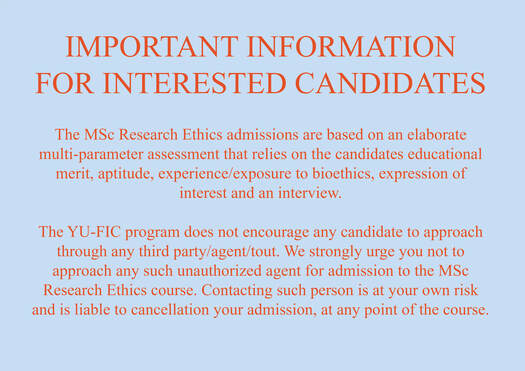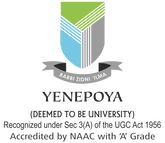FIRST TIME IN INDIA....
|
|
Important information for admissions for 2022-24 MSc Research Ethics program:
Limited seats. No tuition fee (for the period of the grant) Stipendiary full-time, semester-based, two-year MSc Research Ethics Last date for submitting application form : 15 June 2022 (3:30 PM IST) Interview for shortlisted candidates: 29, 30 June 2022 Information to finally selected candidates: Last week of July 2022 Course commencement: 01 September 2022 |
***APPLICATION CLOSED*** |
Background:
Centre for Ethics, Yenepoya (deemed to be) University was established in February 2011, as a centre dedicated to re-awakening the centrality of bioethics in healthcare and education in India. Since then the Centre has been successfully running two postgraduate diplomas (PG Diploma Bioethics & Medical Ethics; PG Diploma Clinical Ethics). In addition, the Centre runs an annual four-day intensive summer workshop in research ethics (last week of May of each year), and a host of other value added courses for undergraduate and postgraduate students of healthcare education. Over the last seven years, we have trained more than 250 healthcare and science professionals and also mentored several institutions, both in academic bioethics and research ethics. Our alumni are now in all corners of the country and some even abroad.
National Institutes of Health (NIH) Bethesda, USA is one of the most prestigious, world-renowned healthcare associated funding agencies. The Fogarty International Center (FIC) promotes the NIH mission overseas, by supporting US and international researchers in health care. In appreciation of the trail-blazing work in bioethics education carried out by the Centre for Ethics, Yenepoya (deemed to be) University, the NIH was pleased to award an educational research grant to design, implement and assess an innovative and unique Master's program in Research Ethics, especially tailored to India's needs. The grant supports the running of the Master's program for a period of five years. The Health Ministry Screening Committee, Ministry of Health and Family Welfare, Government of India has approved this program.
Name of the Program: Yenepoya University-Fogarty International Center Research Ethics Master's Program for India (YU-FIC REMPI)
NIH Grant No: 1R25TW010305
Period of the grant: 2017-2021
Names of the Program Directors/Principal Investigators (PD/PI):
Dr. Vina Vaswani, Director, Centre for Ethics, Yenepoya deemed to be University, Mangalore 575018 India
Dr. Bebe Loff, Director, Michael Kirby Centre for Public Health and Human Rights, Monash University, Australia
Names of the faculty (in alphabetical order):
International:
Dr. Bebe Loff - Australia
Dr. Bert Gordijn - Ireland
Dr. Ruth Macklin - USA
Dr. Corinna Porteri - Italy
National:
Dr. Amar Jesani Mumbai
Dr. Anant Bhan Pune/Bhopal
Dr. Sanjay Zodpey PHFI, New Delhi
Dr. Arun Bhatt Mumbai
Dr. Mala Ramanathan SCTIMST, Trivandrum
Dr. Nandini Kumar Manipal University
Dr. Gagandeep Kang
Dr. Sandhya Srinivasan
Ms Sarojini N, SAMA Delhi
Dr. Shymala Natarajan Chennai
In-house:
Dr. Abhay Nirgude
Ms. Seema Patil (Biostatistics)
Dr. Ravi Vaswani
Dr. Uma Kulkarni
Dr. Madhavi Bhargava
Name of the academic degree: M. Sc Research Ethics
Course design: Two years; full-time; semester-based
Admission eligibility: Bachelor's in any science stream (MBBS, BDS, BPT, BHA, B.Sc, etc) recognized by the University Grants Commission of India (or its equivalent as approved by the UGC).
Selection criteria: The number of seats are very limited and the selection process is highly competitive, based on qualifications, research/ethics work experience, letter of intent, interview, English language proficiency.
Course objectives:
The objectives of this program are
Student learning objectives include:
Course content:
The Master’s curriculum is comprehensive, incorporating knowledge of ethical principles, processes, and policies related to local, national and international settings. The curriculum enhances the practical skills in research methods, ethics education, ethical review, transformational leadership, consultation and encourages and maintains the involvement in teaching, of national and international experts in bioethics and research ethics through didactic and practicum. The curriculum is tailored to suit Indian context. The program facilitates transfer of skills in research ethics using mentorship model and through ethics-related teaching, research and practicum.
Topics include Moral reasoning and ethical theories, Bioethical principles in biomedical research involving human subjects, International and national laws, regulations and guidelines, Research methodology, Responsible conduct in research, Ethics of Indian Systems of Medicine, Gender ethics, Vulnerability, Ethics of genetics and reproductive healthcare, Public Health Ethics and Health Technology Assessment.
Teaching-Learning modalities:
Assessment (Evaluation):
Fees:
No tuition fee will be charged for the period of the grant
Selected students will be eligible for a stipend and subsistence allowance
Hostel and other facilities will be charged as per University rules
Examination fees and convocation fees will be charged as per University rules
Centre for Ethics, Yenepoya (deemed to be) University was established in February 2011, as a centre dedicated to re-awakening the centrality of bioethics in healthcare and education in India. Since then the Centre has been successfully running two postgraduate diplomas (PG Diploma Bioethics & Medical Ethics; PG Diploma Clinical Ethics). In addition, the Centre runs an annual four-day intensive summer workshop in research ethics (last week of May of each year), and a host of other value added courses for undergraduate and postgraduate students of healthcare education. Over the last seven years, we have trained more than 250 healthcare and science professionals and also mentored several institutions, both in academic bioethics and research ethics. Our alumni are now in all corners of the country and some even abroad.
National Institutes of Health (NIH) Bethesda, USA is one of the most prestigious, world-renowned healthcare associated funding agencies. The Fogarty International Center (FIC) promotes the NIH mission overseas, by supporting US and international researchers in health care. In appreciation of the trail-blazing work in bioethics education carried out by the Centre for Ethics, Yenepoya (deemed to be) University, the NIH was pleased to award an educational research grant to design, implement and assess an innovative and unique Master's program in Research Ethics, especially tailored to India's needs. The grant supports the running of the Master's program for a period of five years. The Health Ministry Screening Committee, Ministry of Health and Family Welfare, Government of India has approved this program.
Name of the Program: Yenepoya University-Fogarty International Center Research Ethics Master's Program for India (YU-FIC REMPI)
NIH Grant No: 1R25TW010305
Period of the grant: 2017-2021
Names of the Program Directors/Principal Investigators (PD/PI):
Dr. Vina Vaswani, Director, Centre for Ethics, Yenepoya deemed to be University, Mangalore 575018 India
Dr. Bebe Loff, Director, Michael Kirby Centre for Public Health and Human Rights, Monash University, Australia
Names of the faculty (in alphabetical order):
International:
Dr. Bebe Loff - Australia
Dr. Bert Gordijn - Ireland
Dr. Ruth Macklin - USA
Dr. Corinna Porteri - Italy
National:
Dr. Amar Jesani Mumbai
Dr. Anant Bhan Pune/Bhopal
Dr. Sanjay Zodpey PHFI, New Delhi
Dr. Arun Bhatt Mumbai
Dr. Mala Ramanathan SCTIMST, Trivandrum
Dr. Nandini Kumar Manipal University
Dr. Gagandeep Kang
Dr. Sandhya Srinivasan
Ms Sarojini N, SAMA Delhi
Dr. Shymala Natarajan Chennai
In-house:
Dr. Abhay Nirgude
Ms. Seema Patil (Biostatistics)
Dr. Ravi Vaswani
Dr. Uma Kulkarni
Dr. Madhavi Bhargava
Name of the academic degree: M. Sc Research Ethics
Course design: Two years; full-time; semester-based
Admission eligibility: Bachelor's in any science stream (MBBS, BDS, BPT, BHA, B.Sc, etc) recognized by the University Grants Commission of India (or its equivalent as approved by the UGC).
Selection criteria: The number of seats are very limited and the selection process is highly competitive, based on qualifications, research/ethics work experience, letter of intent, interview, English language proficiency.
Course objectives:
The objectives of this program are
- To build on the existing suite of teaching programs and activities of the Centre for Ethics at Yenepoya University by offering a Master’s in Research Ethics
- To ensure that the Master’s curriculum is comprehensive, incorporating knowledge of ethical principles, processes, and policies related to local and international, clinical and public health research, including Indian systems of medicine (includes Ayurveda, Yoga & Naturopathy, Unani, Siddha and Homeopathy, acronymized to AYUSH)
- To ensure that the curriculum enhances practical skills in research methods, ethics education, ethical review, transformational leadership, and consultation
- To encourage and maintain the involvement in teaching, of national and international experts in bioethics and research ethics, so students are exposed to a broad range of views and approaches
- To facilitate transfer of skills in research ethics and create a national pool of leaders
- To support and mentor students who wish to perform roles in ethics-related teaching, research and practice, and in publishing their work
- To inculcate responsible research conduct in the students
- To expand the suite of activities available to alumni
- To strengthen ethical research environs in India, by increasing ethics-trained researcher pool
- To bring about an attitudinal change in all the stakeholders in the health care research arena
- To strengthen the ethical review process of ethics committees by providing a pool of trained research ethicists
- To prepare students for doctoral research programs...to take up leadership roles in research ethics, and to provide a pool of expertise for academic, research and policy development
Student learning objectives include:
- To introduce students to basics of philosophy (including Western, Hindu, Islam and Buddhist)
- To familiarize students with the history of the development of ethics in research
- To provide students with competencies in the use of ethical theories and principles in identifying, addressing and resolving ethical issues in research ethics
- To familiarize students with ethical issues in public health research
- To familiarize students with modern research methodologies including statistical analysis
- To familiarize students with responsible conduct of research and to inculcate integrity in research
- To make students understand the ethical issues in the area of scientific writing and ethics of publication
- To get students to understand the regulations and guidelines in force in the country and in the international arena (including ICH-GCP, GLP, GMP guidelines)
Course content:
The Master’s curriculum is comprehensive, incorporating knowledge of ethical principles, processes, and policies related to local, national and international settings. The curriculum enhances the practical skills in research methods, ethics education, ethical review, transformational leadership, consultation and encourages and maintains the involvement in teaching, of national and international experts in bioethics and research ethics through didactic and practicum. The curriculum is tailored to suit Indian context. The program facilitates transfer of skills in research ethics using mentorship model and through ethics-related teaching, research and practicum.
Topics include Moral reasoning and ethical theories, Bioethical principles in biomedical research involving human subjects, International and national laws, regulations and guidelines, Research methodology, Responsible conduct in research, Ethics of Indian Systems of Medicine, Gender ethics, Vulnerability, Ethics of genetics and reproductive healthcare, Public Health Ethics and Health Technology Assessment.
Teaching-Learning modalities:
- Classroom teaching (active lectures)
- Library assignments
- Online assignments
- Skits, role plays, reflective essays, collage, poetry writing
- Practicum
- Research/capstone project: A short research performed and submitted in publishable format.
Assessment (Evaluation):
- Internal: Regular continuous assessment will be done by the faculty and assessed by the program director. Continuous assessment will involve evaluation of reflective essays, critical appraisals of audio-visual documentaries, level and quality of participation in online forums and case-study analysis.
- University exams: Semester examinations (theory and practical) will be held at the completion of each semester.
- Eligibility to appear:
- 75% attendance (theory and practical separately)
- Submission of assignments on time
- Submission of research/capstone project on time
- Internal assessment marks of at least 50% in each semester.
- Other eligibility criteria as per University rules.
- Criteria for pass/first class/distinction:
- Pass: a minimum of 35% in theory and viva separately
- Grades will be assigned for each semester
Fees:
No tuition fee will be charged for the period of the grant
Selected students will be eligible for a stipend and subsistence allowance
Hostel and other facilities will be charged as per University rules
Examination fees and convocation fees will be charged as per University rules
Student profile (Batch A - 2018/19):
Number of admissions: 11
Gender distribution: 9 females; 2 males
Educational background: Medical - 2, Dental - 1, Homeopathy - 1, Forensic Science - 1, Biochemistry - 1, Laboratory Medicine Technology - 1, Biotechnology - 2, Electronics - 1, Pharmacy - 1
State-wise distribution (7 states): Karnataka – 3, Kerala – 2, Bihar – 2, Tamil Nadu – 1, Maharashtra – 1, Assam – 1, West Bengal – 1
Student profile (Batch B - 2019/20):
Number of admissions: 9
Gender distribution: 7 females; 2 males
Educational background: Dental - 3, Homeopathy - 2, Forensic Anthropology- 1, Pharmacy - 1, Social Science - 1, Microbiology - 1
State-wise distribution (4 states): Karnataka – 2, Kerala – 5, Uttar Pradesh – 1, Maharashtra – 1
Student profile (Batch C - 2020/21):
Number of admissions: 6
Gender distribution: 4 females; 2 males
Educational background: Dental - 3, Homeopathy - 1, Nursing- 1, Microbiology - 1
Geographic distribution (3 states, International-1): Karnataka – 2, Kerala – 2, Maharashtra –1 , Bhutan-1
Student profile (Batch D - 2021/22):
Number of admissions: 4
Gender distribution: 3 females; 1 males
Educational background: Dental - 1, Social Science-1, Home-Science- 1, Hospital Administration- 1
Geographic distribution (2 states, International- 2 : Karnataka – 1, Kerala – 1, Zimbabwe- 1, Nigeria- 1
Student profile (Batch E - 2022/23):
Number of admissions: 6
Gender distribution: 3 females; 3 males
Educational background: Dental - 2, Ayush Medicine-2, Biochemistry- 1, Biotechnology- 1
Geographic distribution (2 states, International- 3 : Karnataka – 1, Kerala – 2 , Nigeria- 1, Afghanistan - 2)
Number of admissions: 11
Gender distribution: 9 females; 2 males
Educational background: Medical - 2, Dental - 1, Homeopathy - 1, Forensic Science - 1, Biochemistry - 1, Laboratory Medicine Technology - 1, Biotechnology - 2, Electronics - 1, Pharmacy - 1
State-wise distribution (7 states): Karnataka – 3, Kerala – 2, Bihar – 2, Tamil Nadu – 1, Maharashtra – 1, Assam – 1, West Bengal – 1
Student profile (Batch B - 2019/20):
Number of admissions: 9
Gender distribution: 7 females; 2 males
Educational background: Dental - 3, Homeopathy - 2, Forensic Anthropology- 1, Pharmacy - 1, Social Science - 1, Microbiology - 1
State-wise distribution (4 states): Karnataka – 2, Kerala – 5, Uttar Pradesh – 1, Maharashtra – 1
Student profile (Batch C - 2020/21):
Number of admissions: 6
Gender distribution: 4 females; 2 males
Educational background: Dental - 3, Homeopathy - 1, Nursing- 1, Microbiology - 1
Geographic distribution (3 states, International-1): Karnataka – 2, Kerala – 2, Maharashtra –1 , Bhutan-1
Student profile (Batch D - 2021/22):
Number of admissions: 4
Gender distribution: 3 females; 1 males
Educational background: Dental - 1, Social Science-1, Home-Science- 1, Hospital Administration- 1
Geographic distribution (2 states, International- 2 : Karnataka – 1, Kerala – 1, Zimbabwe- 1, Nigeria- 1
Student profile (Batch E - 2022/23):
Number of admissions: 6
Gender distribution: 3 females; 3 males
Educational background: Dental - 2, Ayush Medicine-2, Biochemistry- 1, Biotechnology- 1
Geographic distribution (2 states, International- 3 : Karnataka – 1, Kerala – 2 , Nigeria- 1, Afghanistan - 2)
Brochure |
Projects: |
|
| ||||



